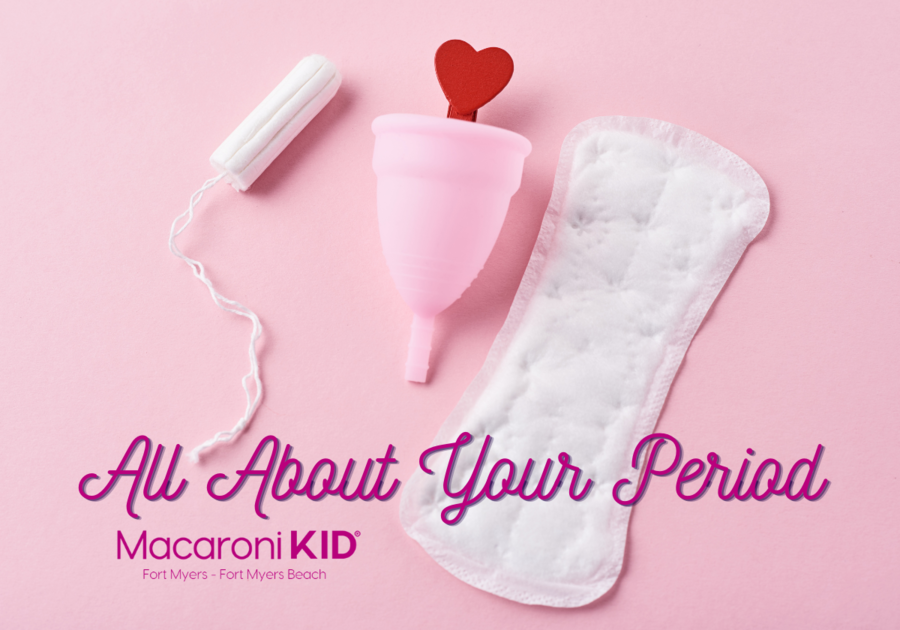You should always consult with your family physician for any questions or concerns related to your family's health. I am not a doctor, nor can I give medical advice.
Aunt Flo, Monthly Friend, Period, That Time of the Month, Lady Business, Code Red ... Whatever you call it, a girl's menstrual cycle is one of the many fun *sarcasm* things about growing up. We are here to support our young girls and help them though their periods!
Periods (menstruation) typically start around age 12 (usually around the same age their mother’s and sisters’ periods began). The average female loses between 4 and 12 teaspoons of fluid during her period, but only a small amount of that is blood.
The feminine hygiene aisle, explained
It's important to know that there are no one-size-fits-all for feminine hygiene products. These come in many color packages, shapes, sizes and brands. Every girl's flow is unique to her, and every flow may be irregular for quite some time following her first period.
Remember, even if a package says that the product is "flushable," your plumbing wouldn't agree - wrap the used [disposable] products in a little toilet paper and throw them in the trash.
Pads - Pads are cloth-like pads with a sticky underside, that stick to your underwear to catch any fluid. These should be changed when they feel too wet or start leaking. There are different sizes from pantiliners (small, short and thin) to overnight pads (longer, wider, more absorbent).
Tampons - Tampons are inserted into the vagina, but should mostly be used if you have a regular period and can guess as to how heavy your flow is. They come in different sizes like: light, regular, super, super-plus, and extra. You should always use the smallest size to fit your period's flow.
Cups - These are typically used by adults and more seasoned period-havers, as it can be tricky to learn how to properly insert them into your vagina.
Period Underwear - These are underwear that are absorbent like cloth diapers; these are washable and reusable, but can be pricey.
Period Poverty
Did you know there is such thing as period poverty? This is when you cannot afford feminine hygiene products, miss school, events or activities due to a lack of supplies.
If you find yourself in need of period supplies, please call 211 in Lee County or visit this site to view a map of agency distribution partners.
What's in a period kit?
Creating a period kit can be as simple as a pencil case in your backpack which holds an emergency stash of feminine hygiene supplies for when your girl is outside of the home. Your kit could include:
- A couple of different sized pads
- Clean pair of underwear or period underwear
- Baby wipes in a Ziploc bag
- Tampons, if preferred for your teen
- If there's room, you may want to keep an extra set of shorts/pants in your backpack, locker, etc.
Remember that this is nothing to be ashamed of, and it is a normal part of growing up. If you don't have something you need, ask to visit the nurse!
How to talk about your period
Open and frequent communication is key to helping our girls understand the basics and how to navigate puberty and their periods. We need to help them learn about themselves, so that they are able to better care for themselves in the future.
Great Conversations has classes and resources for families with questions about puberty - check out this quick video below to use as a Great Conversation starter between you and your child.
Period Hacks
- Heating pad and Midol/Tylenol handy - this is good to alleviate cramps for older teens/adults
- Have period supplies ready and under your sink - it's better to be prepared than to have to run to the store at a bad time
- Exercising, walking, yoga - help with cramps, bloating, and lightening your flow
- Have period snacks hidden in your pantry/freezer - treats always make you feel better
- Stay hydrated and avoid caffeine - caffeine will only increase bloating and cramps
- Get enough rest - sleeping in the fetal position can also help reduce cramps due to muscle relaxation
- Use a period tracker/calendar - this can help you anticipate when your next one will come and go (also, your doctor will probably always ask you when your last period was)



